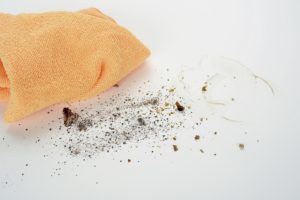Anders Hellqvist, Assortment Manager Wiping & Cleaning for Tork, discusses how implementing proper wiping and cleaning procedures can benefit business audits, streamline production and reduce the risks to workforce health.
Employers are investing in the latest machinery to keep ahead of their competition, but with the demand to achieve higher targets, tasks such as cleaning equipment can move lower down the priority list. General maintenance tasks tend to not be considered a primary concern, however, such processes can have a significant impact on business.
Audit success
 Audits can make or break a business, causing a multitude of stress for production or health and safety managers. Impressions of the production space are important as it reflects the company and its product. An untidy factory or a work space cluttered with rags fails the 5S methodology; a system implemented to help better organise a company and its resources, streamline production and eliminate waste. Failing 5S principles can cause a negative spiral, triggering accidents at work, assembly line disruptions and workforce stress. A spotless factory inspires confidence – in the company, employees and in the product.
Audits can make or break a business, causing a multitude of stress for production or health and safety managers. Impressions of the production space are important as it reflects the company and its product. An untidy factory or a work space cluttered with rags fails the 5S methodology; a system implemented to help better organise a company and its resources, streamline production and eliminate waste. Failing 5S principles can cause a negative spiral, triggering accidents at work, assembly line disruptions and workforce stress. A spotless factory inspires confidence – in the company, employees and in the product.
Rags are commonly used to clean both machinery and the workplace, though in terms of efficiency and professionalism they are less than ideal. Rags can clutter the area, harbouring dangerous chemicals and dusts, often spreading grease or oil rather than absorbing it. Industrial wipes offer a practical solution, helping to eliminate negative impressions. Dispensed from a fixed dispenser or portable box, industrial wipes can be close to hand saving time, reducing waste up to 95% and storage space up to 75%. Less stress, more efficiency.
Service delivery
The quest to do more in less time is a fact of life for MRO businesses that need to get the most out of their highly-skilled technicians. Many MRO tasks require wiping and cleaning work and because of the complexity of the machinery and equipment this work must be done manually by the technicians.
Without suitable tools and equipment, tasks such as cleaning can take longer than necessary. For instance, due to the poor performance of traditionally used rags, technicians face lengthier manual work than required. This means workers need to focus too much time and effort on wiping and cleaning – instead of more other and more value-adding tasks. As a result, services take too long, technicians face additional stress, and quality of service can be compromised.
Solutions such as industrial cleaning wipes can simplify operations, increasing efficiency. Wipers work faster compared to rags, offer consistent quality and require less effort to do the same tasks.
Workforce health
MRO work often requires use of solvents, and with only rags to hand technicians are being exposed to high levels of VOC emissions.
Under the Health and Safety at Work Act 1974 and the Management of Health and Safety at Work Regulations 1990, employers have a legal duty to assess all risks that could impact the health and safety of employees, including these hidden-risks throughout cleaning procedures. Rags can be completely soaked in solvent chemicals that evaporate into the air, this exposure is potentially damaging to the health of operators. They can also be left lying around the workplace which is unhygienic and unsafe.
Employers need to take this issue seriously and look at new methods that could help to reduce health and safety risks. The solution is simple. Industrial wipes are soft, flexible and excellent for cleaning oil and grease. Using professional cleaning wipes as opposed to rags is proven to enhance hygiene and safety, using less solvents, saving more time, and requiring less storage space.
Individuals can work in a smarter and safer way, increasing worker satisfaction as the maintenance task can be completed more quickly, ultimately improving processes in the workplace.
Approaches to managing the risks associated Musculoskeletal disorders
In this episode of the Safety & Health Podcast, we hear from Matt Birtles, Principal Ergonomics Consultant at HSE’s Science and Research Centre, about the different approaches to managing the risks associated with Musculoskeletal disorders.
Matt, an ergonomics and human factors expert, shares his thoughts on why MSDs are important, the various prevalent rates across the UK, what you can do within your own organisation and the Risk Management process surrounding MSD’s.

 Audits can make or break a business, causing a multitude of stress for production or health and safety managers. Impressions of the production space are important as it reflects the company and its product. An untidy factory or a work space cluttered with rags fails the 5S methodology; a system implemented to help better organise a company and its resources, streamline production and eliminate waste. Failing 5S principles can cause a negative spiral, triggering accidents at work, assembly line disruptions and workforce stress. A spotless factory inspires confidence – in the company, employees and in the product.
Audits can make or break a business, causing a multitude of stress for production or health and safety managers. Impressions of the production space are important as it reflects the company and its product. An untidy factory or a work space cluttered with rags fails the 5S methodology; a system implemented to help better organise a company and its resources, streamline production and eliminate waste. Failing 5S principles can cause a negative spiral, triggering accidents at work, assembly line disruptions and workforce stress. A spotless factory inspires confidence – in the company, employees and in the product.